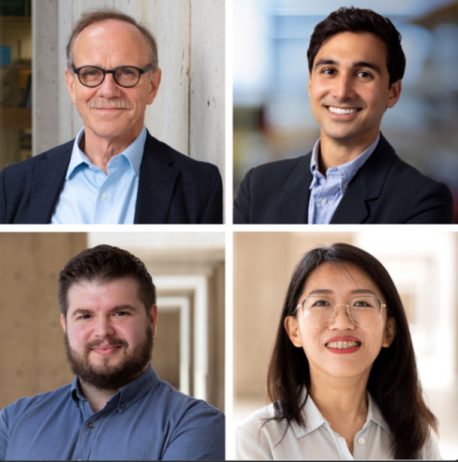
January 17, 2024
LA JOLLA—Salk Institute Professor Rusty Gage and Assistant Professor Pallav Kosuri have been awarded $1.3 million by the W. M. Keck Foundation to fund a novel investigation into the way brain and heart cell functions decline over time due to ribosubstitution events—cellular repair of DNA damage with RNA building blocks rather than DNA building blocks. The award combines the biological discovery of ribosubstitution made by Senior Research Associate Jeff Jones in Gage’s lab with the technological advancements established by Postdoctoral Researcher Yuening Liu in Kosuri’s lab. The W. M. Keck Foundation was established with the goal of generating far-reaching benefits for humanity by supporting outstanding science, engineering, and medical research.

“I am delighted that Rusty and Pallav and their teams have received this award from the Keck Foundation to investigate aging brain and heart cells from this novel perspective,” says Salk President Gerald Joyce. “As an RNA scientist myself, I am eager to see how they unravel the connection between ribosubstitution of the genome and cellular aging.”
Some tissues, such as skin, bones, and skeletal muscles, can regenerate to stave off age-related decline. Yet vital organs like the brain and heart irreversibly decline in function over time. One possible reason for this decline is the specialization of heart and brain cells. Once one of those vital cells begins to pump blood or send messages in the brain, it cannot afford to take a break for the sake of rejuvenation. And when those cells go long enough without a break, they lose the ability to take a break at all.
The breaks in activity that these specialized heart and brain cells forgo are fundamental to cellular regeneration and replication in other organs, such as skin and bone. During those breaks, DNA building blocks are used to repair damaged DNA and to create new DNA. Skipping those breaks means DNA building blocks aren’t used as frequently in specialized heart and brain cells, causing these cells to decrease the production of DNA. Crucially, however, the abundance of RNA building blocks stays the same, since production of RNA is necessary for the day-to-day activities of the cells—resulting in more RNA building blocks than DNA building blocks present in these specialized cells.
Because of this imbalance between RNA and DNA, ribosubstitution events take place: RNA building blocks are sometimes mistakenly inserted at DNA damage sites instead of DNA building blocks. Ribosubstitution events increase the risk for further DNA damage, ultimately destabilizing the cell’s DNA. Having RNA bases mixed into the DNA might also alter the way the DNA strand is shaped and regulated, though exactly how is not yet fully known.
“The imbalance between RNA and DNA in neurons and cardiomyocytes increases the likelihood of ribosubstitution events that weaken the integrity of DNA and that—we think—could be causing some of the irreversible damage we see accrue over time in the heart and the brain,” says Kosuri. “With support from the Keck Foundation, we look forward to developing new technology to map the effects of ribosubstitution in aging neurons and cardiomyocytes.”
The Salk researchers hope that investigating ribosubstitution events will improve scientific understanding of how human neurons and cardiomyocytes decline in function over time. They plan to catalogue ribosubstitution events across the span of human life using donated tissue samples, which they will accomplish by developing their own single-cell sequencing technology and by repurposing existing mapping methods.
"The technology we develop and the map of ribosubstitution events that we create will be extremely valuable resources in advancing our understanding of aging,” says Gage, also the Vi and John Adler Chair for Research on Age-Related Neurodegenerative Disease. “We can use the resources we develop using this generous Keck Foundation award to determine the tissue-, cell-, and gene-specific effects that ribosubstitution events have on the process of aging.”
About the Salk Institute for Biological Studies:
Unlocking the secrets of life itself is the driving force behind the Salk Institute. Our team of world-class, award-winning scientists pushes the boundaries of knowledge in areas such as neuroscience, cancer research, aging, immunobiology, plant biology, computational biology, and more. Founded by Jonas Salk, developer of the first safe and effective polio vaccine, the Institute is an independent, nonprofit research organization and architectural landmark: small by choice, intimate by nature, and fearless in the face of any challenge. Learn more at www.salk.edu.
About the W. M. Keck Foundation:
Based in Los Angeles, the W. M. Keck Foundation was established in 1954 by the late W. M. Keck, founder of the Superior Oil Company. The Foundation’s grant making is focused primarily on pioneering efforts in the areas of medical research and science and engineering. The Foundation also supports undergraduate education and maintains a Southern California Grant Program that provides support for the Los Angeles community, with a special emphasis on children and youth. For more information, visit www.wmkeck.org.
Office of Communications
Tel: (858) 453-4100
press@salk.edu